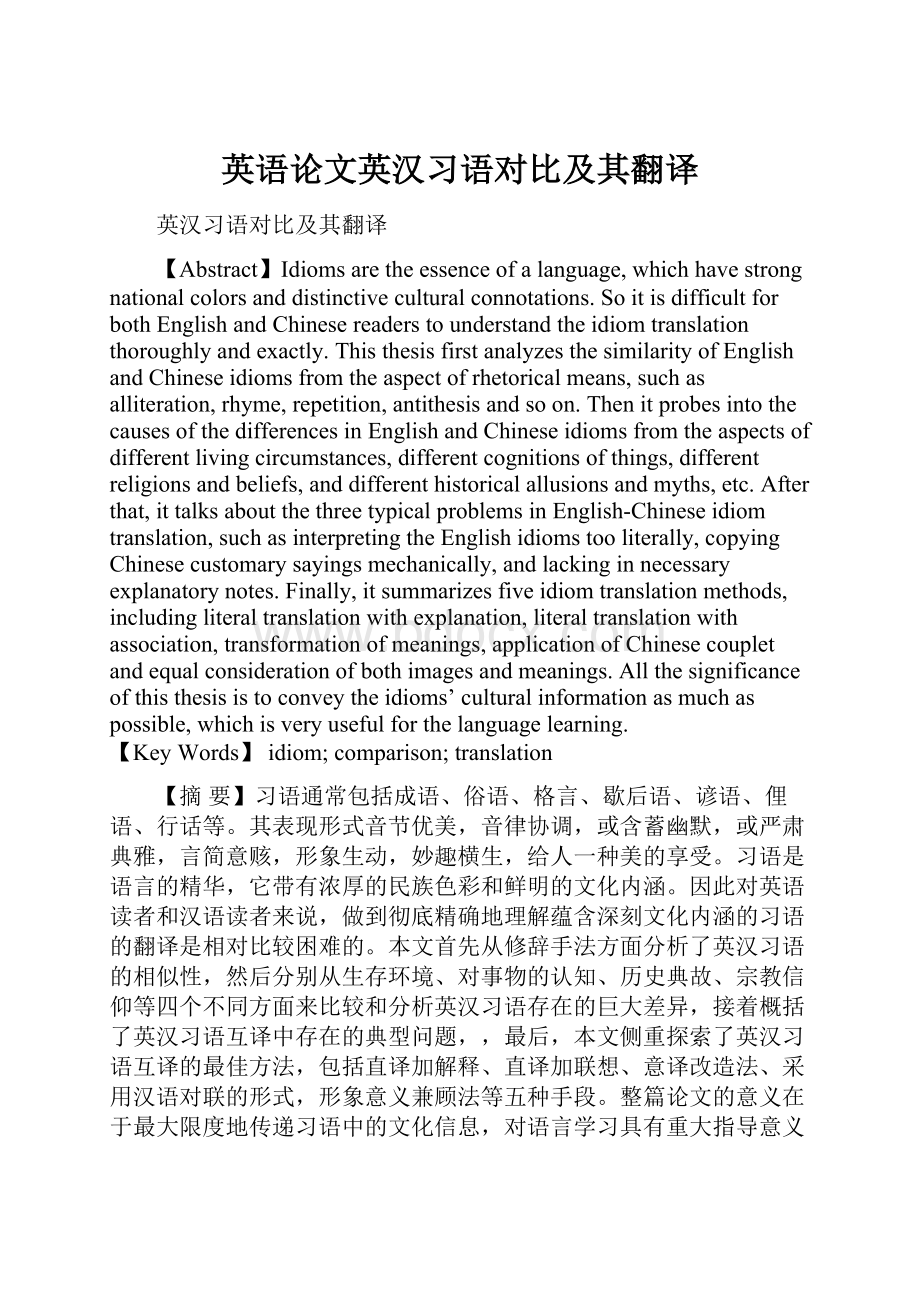英语论文英汉习语对比及其翻译.docx
《英语论文英汉习语对比及其翻译.docx》由会员分享,可在线阅读,更多相关《英语论文英汉习语对比及其翻译.docx(17页珍藏版)》请在冰豆网上搜索。

英语论文英汉习语对比及其翻译
英汉习语对比及其翻译
【Abstract】Idiomsaretheessenceofalanguage,whichhavestrongnationalcolorsanddistinctiveculturalconnotations.SoitisdifficultforbothEnglishandChinesereaderstounderstandtheidiomtranslationthoroughlyandexactly.ThisthesisfirstanalyzesthesimilarityofEnglishandChineseidiomsfromtheaspectofrhetoricalmeans,suchasalliteration,rhyme,repetition,antithesisandsoon.ThenitprobesintothecausesofthedifferencesinEnglishandChineseidiomsfromtheaspectsofdifferentlivingcircumstances,differentcognitionsofthings,differentreligionsandbeliefs,anddifferenthistoricalallusionsandmyths,etc.Afterthat,ittalksaboutthethreetypicalproblemsinEnglish-Chineseidiomtranslation,suchasinterpretingtheEnglishidiomstooliterally,copyingChinesecustomarysayingsmechanically,andlackinginnecessaryexplanatorynotes.Finally,itsummarizesfiveidiomtranslationmethods,includingliteraltranslationwithexplanation,literaltranslationwithassociation,transformationofmeanings,applicationofChinesecoupletandequalconsiderationofbothimagesandmeanings.Allthesignificanceofthisthesisistoconveytheidioms’culturalinformationasmuchaspossible,whichisveryusefulforthelanguagelearning.
【KeyWords】idiom;comparison;translation
【摘要】习语通常包括成语、俗语、格言、歇后语、谚语、俚语、行话等。
其表现形式音节优美,音律协调,或含蓄幽默,或严肃典雅,言简意赅,形象生动,妙趣横生,给人一种美的享受。
习语是语言的精华,它带有浓厚的民族色彩和鲜明的文化内涵。
因此对英语读者和汉语读者来说,做到彻底精确地理解蕴含深刻文化内涵的习语的翻译是相对比较困难的。
本文首先从修辞手法方面分析了英汉习语的相似性,然后分别从生存环境、对事物的认知、历史典故、宗教信仰等四个不同方面来比较和分析英汉习语存在的巨大差异,接着概括了英汉习语互译中存在的典型问题,,最后,本文侧重探索了英汉习语互译的最佳方法,包括直译加解释、直译加联想、意译改造法、采用汉语对联的形式,形象意义兼顾法等五种手段。
整篇论文的意义在于最大限度地传递习语中的文化信息,对语言学习具有重大指导意义。
【关键字】习语;对比;翻译
1.Introduction
Idiomsaretheessenceofalanguage,whicharealwaysphilosophicalandeternal.AccordingtoOxfordAdvantagedLearner’sEnglish-ChineseDictionary,anidiomis“aphraseorsentencewhosemeaningisnotclearfromthemeaningofitsindividualwordsandwhichmustbelearntasawholeunit”.“Inthebroadsense,idiomsmayinclude:
setphrases;proverbs;sayings;epigrams;slangexpressions;colloquialisms;quotations;two-partallegoricalsayings,ofwhichthefirstpart,alwaysstated,isdescriptive,whilethesecondpart,sometimesunstated,carriesthemessage(chieflyinChinese).WhileinChinese,idiomsarecalledas‘熟语’,including:
短语,成语(usuallyconsistingoffourwords),俗语,谚语,格言,箴言,名言(quotationorrecordedutterance),警句,隽语,俚语,粗话,行话,歇后语(includingpun),习语,etc.”[1]However,thethesiswilldiscussEnglishandChineseidiomsinanarrowsense,andonlysetphrasesandproverbswillbeunderdiscussion.
EnglishidiomsandChineseidiomsaregemsofthetwolanguagesaswellasthecrystallizationofthetwonationalcultures.Mostofidiomsareofvividimageswhichareappropriatelyusedtocomparetootherthings,consequently,theyoftencontaindistinctivenationalandlocalcolors.Someidiomshavequiteclearmeanings,someareimplicitandprofound,whichcouldcauseagreatdealofassociation,whileothersmayincludeseveralmeanings,whichdependonthecontexttodefineitsrealindication.
BothEnglishandChineseidiomsareimportantrhetoricalmeansinlanguageaswellastheassembledmanifestationsofdifferentkindsofrhetoricalmeansinitself.Manyidiomshavesymmetricalforms,beautifulsyllablesandharmoniousrhythms.Allthesefeaturesgiverisetotheparticulardifficultiesintranslation:
itismoredifficulttounderstandandmorechallengingtoconveytheculturalinformationclearlyandexactlythanthecommonlanguage,however,inordertokeepthetranslationfaithful,thesefeaturesshouldbepreserved.Notonlydoidiomsappearlargelyinliteraryworks,butalsoinpoliticalandscientificthesis.Thequalitiesoftheidiomstranslationdirectlyaffectthewholetranslation.Soitisessentialtostudytheidiomsandtheirmethodsoftranslationseriously.
2.ThesimilaritybetweenEnglishandChineseidiomsinrhetoricalmeans
Althoughthereisalwayssome“culturaldistance”betweenChineseandEnglish,thereismuchoverlap,too,anditshowsinmanyaspects.However,thefocalpointofthethesiswilllieintheanalysisoftheEnglishandChineseidiomssimilarityfromtheviewofrhetoricalmeans.
BothEnglishandChineseidiomsusuallyadoptrhetoricalmeans,suchasalliteration,rhyme,repetition,andantithesis,etc,forthepurposeofenrichingtherhymeandrhythm.
2.1Alliteration
“Alliterationistheoccurrenceofthesameletterorsoundatthebeginningoftwoormorewordsinsuccession”[2],whichsoundscontinualandiseasytoreadandtoremember.BothEnglishandChineseidiomstakefulladvantagesofthemeans,sothattheycouldbepasseddownfromgenerationtogeneration.Let’slookatsomeexamples.
InChinesethereare“恍恍惚惚,红红火火,乒乒乓乓”,etc.InEnglishtherearealso“ascoolasacucumber”(泰然自若),“asbusyasabee”(忙个不停),“titfortat”(以牙还牙),“asthickasthieves”(非常亲密,要好),“singasongofsixpence”,“‘partandparcel’(主要部分),‘mightandmain’(竭尽全力)”,[3]“Moneymakesthemarego.”(有钱能使鬼推磨),etc.
Throughtheaboveexamples,wemaywellseethatbothEnglishandChineseidiomsarepopularbythismeans.
2.2Rhyme
“Rhymeisthesamenessofsoundbetweenwordsorsyllable”[4],whichsoundsverybeautiful.SomeEnglishandChineseidiomsusethismethodaswelltoachievetheacousticenjoyment.Forexample:
InChinese,thereare“从善如登,从恶如崩、不经一事,不长一智、差之毫厘,缪以千里、失之东隅,收之桑榆”,etc.,whichusethemeansofrhyme.InEnglish,wealsocanfinditin“Afriendinneedisafriendindeed.”,“Beggarscan’tbechoosers.”,“Eastorwest,homeisthebest.”,“Healthisbetterthanwealth.”,“‘assnugasabuginarug’(舒舒服服),‘highanddry’(孤立无援),‘byhookorbycrook’(不择手段)”[5],etc.
BothEnglishandChineseidiomsthatusethisrhetoricalmeansareoftinklingandjinglingsounds.Notonlyaretheyeasytoremember,butalsoitseemsthatwearereadingabeautifulshortpoem.
2.3Repetition
Inrhetorics,“repetitionisacommonlyseenrhetoricaldevice,whichusuallyrepeatsasentenceorpartofsentenceatboththebeginningandendoflongsentences,stanzas,orparagraphs.Themainfunctionofrepetitionistoemphasizethekeypoints.”[6]BothEnglishandChineseidiomsusethismethodtoachievetheemphaticeffect.The
examplesarelikethefollowing:
InChinese,thereare“喜气洋洋,多多益善,沾沾自喜,泱泱大风,姗姗来迟,亭亭玉立,想入非非,落落大方,种瓜得瓜,种豆得豆”etc.InEnglish,thereare“measureformeasure”(一报还一报),“stepbystep”(循序渐进),“neckandneck”(并驾齐驱),“diamondcutdiamond”(棋逢对手), “aneyeforaneyeandatoothforatooth”(以眼还眼,以牙还牙), “callaspadeaspade”(直言不讳),etc.
Usingthemeansofrepetitionmakestheidiomshaveobviouslyemphaticobject.Theirmeaningswillbeclearataglance.
2.4Antithesis
“Antithesisisthedeliberatearrangementofcontrastingwordsorideasinbalancedstructuralformstoachieveforceandemphasis.Theformoftheexpressionisveryimportantforeffect,fortheforceoftheemphasis,whetherforprofundityofjudgment,forhumororforsatire,dependschieflyonthejuxtapositionofdirectopposites,ofglaringcontrasts.”[7]Manyidioms,bothEnglishandChinese,adoptthisdevice,too.Theexamplesbelowillustratethepoint:
InChinese,thereare“大同小异,古往今来,冷嘲热讽,阴奉阳违,顾此失彼,因小失大,小事明白,大事糊涂”,etc.InEnglish,thereare“farandnear(四面八方),upsanddowns(盛衰沉浮);soonerorlater(迟早);moreorless(或多或少),pennywise,poundfoolish(小事聪明,大事糊涂)”,etc.
Thoughtheidiomshaveonlyafewwords,theycontainmuchtruthandphilosophyinthembycomparingtwocompletelyoppositethings.Antithesishasplayedanimportantroleinthisaspect,whichmakesthereadershavealotofaftertastewhileponderingoverthem.
3.ThedifferencesbetweenEnglishandChineseidioms
English-speakingandChinese-speakingcountriesaretwodifferentnations,sothereexistsvastdifferencebetweenEnglishandChinesecultureandthisdifferenceoccursinEnglishandChineseidioms,too.
3.1Differentlivingcircumstances
Idiomsarecloselyrelatedtopeople’sworkandlife.Sotheidiomshavestrongnationalcolors.BritainisanislandcountryontheAtlanticocean,surroundedbythesea,whichwasonceleadingtheworldwithitsnavigation,solotsofEnglishidiomshavesomethingtodowithnavigationandfish.Suchas:
adropintheocean“沧海一粟”;plainsailing“一帆风顺”betweenthedevilanddeepsea“进退维谷”;knowtheropes“懂得秘诀”;gowiththestream“随波逐流”;ascloseasanoyster“守口如瓶”;steerclearofalldoubtfulquestions“避免一切暧昧的事情”;feelunderthewater“感觉不适”.
While“Chinaisanagriculturalcountry.Thepeasantshavepresentedmanyidiomsaboutfarmwork,suchas‘斩草除根’whichistranslatedliterallyinto‘tocuttheweedsanddiguptheroots’,itsfigurativemeaningis‘tostampoutthesourceofthetrouble’.Moreexamples:
‘瑞雪兆丰年’(atimelysnowpromisesagoodharvest);‘顺藤摸瓜’(itsoriginalmeaningistofollowthevinetogetthemelon;itsextendedmeaningistotrackdownsomebodyorsomethingbyfollowingclues);‘捡了芝麻,丢了西瓜’(itsoriginalmeaningistopickupthesesameseeds,butoverlookthewatermelons;itsextendedmeaningis‘mindfulofsmallmatterstoneglectoflargeones’)”[8],etc.
Typicallyspeaking,Englishpeopleuse“spendmoneylikewater”todescribesomeonewhosplashesmoneyonsomething.WhileChinesepeoplesay“挥金如土”.“HowevermanyidiomsconcerningboatsandwatercannotbegiventhesameequivalentsinChinese,suchas,torestonone’soars(暂时歇一歇),tokeepone’sheadabovewater(奋力图存)allatsea(不知所措)etc”.[9]
Duetothegeographicalandenvironmentalfactors,thebambooshootsgrowabundantlyinChina,thus,thereareidiomsconcerningbamboo.Onthecontrary,bamboodoesn’tgrowinBritishislandsatall,eventheword“bamboo”isalo